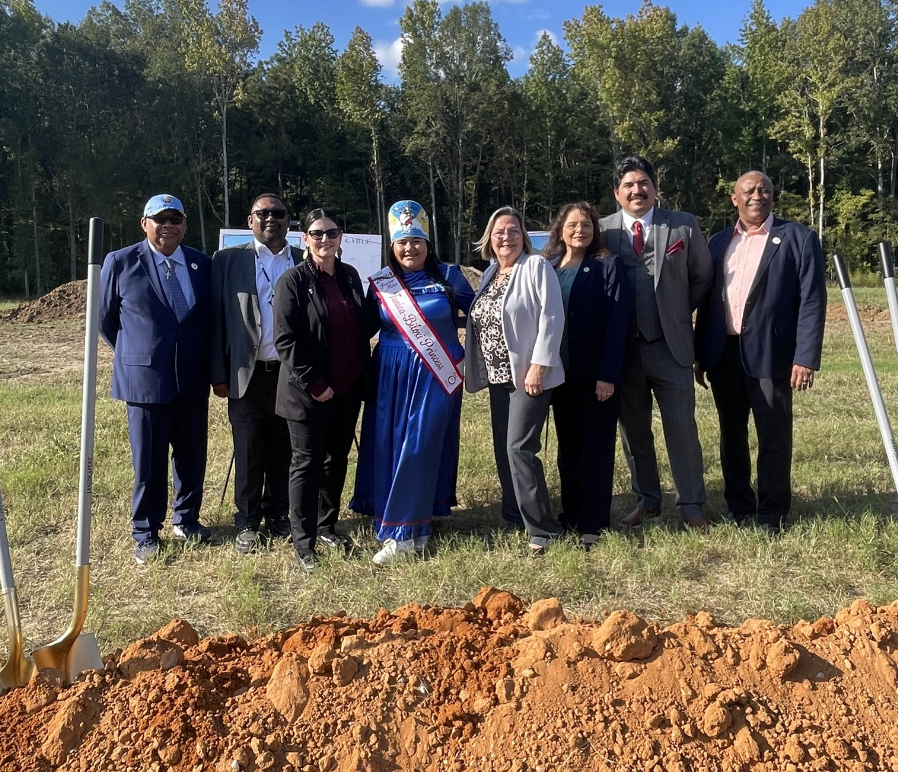
- Details
- By Kaili Berg
In a significant step toward addressing housing needs, the Tunica-Biloxi Tribe of Louisiana has officially broken ground on a multimillion-dollar affordable housing project.
The groundbreaking ceremony, attended by Tribal Council members, citizens, and project leaders, marks the start of a construction effort that will bring 19 new homes to the Tunica-Biloxi Reservation. The project is part of a larger initiative to improve living conditions for Tribal citizens in need.
The project’s first phase will create three-bedroom homes designed for multiple purposes, including elderly housing, emergency shelter, and support for displaced and low-income Tribal citizens. These homes will be built to meet Americans with Disabilities Act (ADA) standards, ensuring accessibility for all.
“For hundreds of years, the Tunica-Biloxi Tribe has worked tirelessly to build each other up, support our friends and neighbors, and find a solution to any inequities our citizens may face,” Tribal Chairman Marshall Pierite said. “Inadequate housing can negatively impact child
development, threaten family stability, and affect one’s mental health and well-being. These new homes will lift that burden off 19 families and provide them with a stable environment so they can grow and prosper.”
The housing development is specifically aimed at providing much-needed assistance to households facing instability due to economic challenges or natural disasters. The Tunica-Biloxi Tribe, like many Native American communities, has faced housing shortages, and this project seeks to alleviate those issues by offering safe and affordable homes to those most in need.
A dedicated team will ensure the project's success, including Tribal Historic Preservation Officer and Project Director Earl Barbry, Jr., Director of Land and Facilities Ron Bordelon, Housing Director Stephanie Stiles, and Tribal Employment Rights Officer Terryl Pierite.
“We are committed to providing a solution to a growing problem that affects tribes across Indian Country. Soon, over a dozen deserving Tunica-Biloxi families will get to call this land their new home, which is why we are putting every bit of hard work we can into making this project beyond the best it can be,”bsaid Barbry.
The project is funded by a $6.4 million grant from the U.S. Department of Housing and Urban Development (HUD) through its Indian Housing Block Grant Program. The Tunica-Biloxi Tribe is one of 22 Native American communities to receive a portion of the $128 million HUD fund, which is dedicated to supporting affordable housing initiatives for tribes. The program helps provide housing construction, rehabilitation, and other essential housing services for Native communities across the country.
In addition to his role as Chairman, Pierite serves on HUD's first-ever Tribal Intergovernmental Advisory Committee (TIAC). The TIAC brings together tribal leaders to strengthen the nation-to-nation relationship between HUD and Native American communities, ensuring that the housing priorities of American Indian and Alaska Native peoples are addressed in federal policy.
The 19 new homes, located on Birch Street within the Tunica-Biloxi Reservation, are expected to be completed by September 2028. This milestone marks a significant step in the Tribe's ongoing commitment to improving the lives of its citizens by providing safe, stable, and affordable housing solutions.
More Stories Like This
Native News Weekly (August 25, 2024): D.C. BriefsUS Presidents in Their Own Words Concerning American Indians
Native CDFI Leaders Push for More Funding
Interior Department Launches Program to Train Native Youth for Wildland Firefighting
Breaking: DHS to Reduce ICE and Border Patrol Officers by 700 in Minneapolis
Help us defend tribal sovereignty.
At Native News Online, our mission is rooted in telling the stories that strengthen sovereignty and uplift Indigenous voices — not just at year’s end, but every single day.
Because of your generosity last year, we were able to keep our reporters on the ground in tribal communities, at national gatherings and in the halls of Congress — covering the issues that matter most to Indian Country: sovereignty, culture, education, health and economic opportunity.
That support sustained us through a tough year in 2025. Now, as we look to the year ahead, we need your help right now to ensure warrior journalism remains strong — reporting that defends tribal sovereignty, amplifies Native truth, and holds power accountable.
 The stakes couldn't be higher. Your support keeps Native voices heard, Native stories told and Native sovereignty defended.
The stakes couldn't be higher. Your support keeps Native voices heard, Native stories told and Native sovereignty defended.
Stand with Warrior Journalism today.
Levi Rickert (Potawatomi), Editor & Publisher


